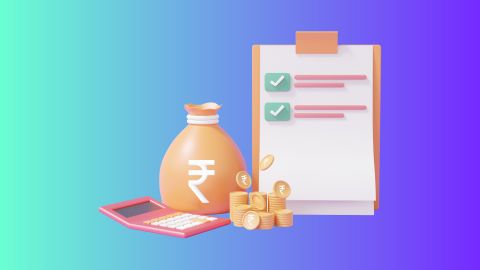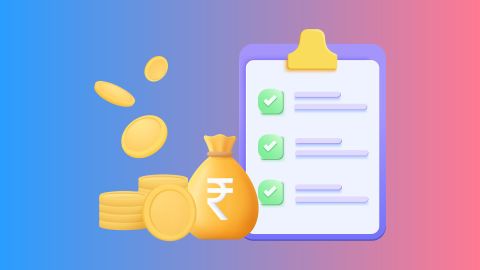Personal loans offer financial flexibility for various needs, from consolidating debt to funding a large purchase. However, understanding the limits on personal loan amounts, how they are decided, and the factors influencing eligibility is crucial. This article will provide a comprehensive overview, including how the maximum and minimum loan amounts are determined and tips for improving your eligibility.
What is the maximum and minimum personal loan amount?
The maximum and minimum personal loan amounts refer to the range of loan sizes a lender is willing to offer. The minimum is the smallest amount you can borrow, while the maximum is the largest. These limits vary by lender and depend on your financial profile and needs. Bajaj Finserv offers personal loans with a minimum amount of %$$PL-Min-Amount$$. On the higher end, the maximum amount can reach up to Rs. 55 lakh, depending on the borrower's financial profile, giving borrowers substantial flexibility for various needs.
How is the personal loan amount decided?
The amount you can borrow through a personal loan is determined based on several key factors:
Income: Your monthly income is a key personal loan eligibility criteria and is one of the most critical factor considered by lenders. They evaluate your capacity to repay the loan based on your income level and overall financial stability. Typically, higher incomes enable you to qualify for larger loan amounts, as they reflect a greater ability to manage and repay debt.
Credit score: Your credit score reflects your creditworthiness. A higher score can increase the loan amount you are eligible for, as it indicates a lower risk to lenders.
Existing financial obligations: Lenders consider your current financial commitments, including other loans and expenses. A lower debt-to-income ratio can enhance your eligibility for a larger loan.
Employment stability: Stable and long-term employment can positively influence the loan amount. Lenders prefer borrowers with consistent income and job security.
Eligibility for applying for a personal loan
To apply for a personal loan, you generally need to meet the following criteria:
Nationality: Indian
- Age: 21 years to 80 years*.
- Employed with: Public, private, or MNC.
- CIBIL Score: 650 or higher.
- Customer profile: Self-employed or Salaried
*You should be 80 years* or younger, at the end of the loan tenure.
Factors influencing your eligibility to avail a personal loan
Several factors can influence your eligibility for a personal loan:
Credit score: A higher credit score can improve your chances of approval and enable you to borrow a higher amount at better interest rates.
Income level: Higher income increases your ability to repay the loan and thus your eligibility for a larger amount.
Debt-to-income ratio: Lenders assess your existing debts relative to your income. A lower ratio indicates better repayment capacity.
Employment history: A stable job history demonstrates financial stability, making you a more attractive borrower.
Loan tenure: The loan tenure affects the amount you can borrow. Longer tenures may allow for larger loans but could also mean higher interest costs.
Tips to improve your personal loan eligibility
Improving your eligibility for a personal loan involves several strategic steps. Here are some key tips to help you enhance your chances of securing a loan:
Improve your credit score: Regularly monitoring and improving your credit score is crucial. Ensure that you pay your bills and existing loans on time to avoid any late fees or negative marks. Additionally, actively work to reduce outstanding debts and avoid taking on new credit obligations unnecessarily. A higher credit score reflects better financial health and makes you a more attractive candidate to lenders, increasing your chances of approval and favourable loan terms.
Increase your income: Enhancing your income can significantly boost your loan eligibility. Consider negotiating a raise at your current job, taking on a side gig, or exploring additional income sources such as freelance work or investments. A higher income improves your ability to repay the loan and lowers the lender's risk, making you eligible for a larger loan amount. This increased financial capacity demonstrates stability and reliability to potential lenders.
Additional read: what is credit score
Reduce existing debt: Reducing your current debt levels can have a positive impact on your loan eligibility. Focus on paying off existing loans and credit card balances to lower your overall debt-to-income ratio. This approach shows lenders that you manage your finances responsibly and can handle additional credit. A lower debt-to-income ratio suggests that you are in a better position to take on and repay a new loan, improving your chances of approval.
Maintain stable employment: Job stability and a consistent income stream are critical factors that lenders consider. Maintaining a steady job or career progression helps build trust with lenders, as it indicates that you have a reliable source of income to meet your loan repayments. A history of stable employment can also strengthen your application, as lenders prefer borrowers who show long-term financial stability and job security.
Apply with a co-applicant: Adding a co-applicant with a strong credit profile can enhance your loan application. A co-applicant with a good credit score and stable income can share the responsibility of loan repayment, reducing the lender's risk. This can potentially increase the loan amount you are eligible for and improve the terms of the loan. Ensure that both applicants are in agreement and understand their shared responsibility for the loan's repayment to maintain a smooth borrowing experience.
How much personal loan can you get based on your salary in India?
In India, the amount of personal loan you can secure generally depends on your salary and financial profile. Typically, lenders may offer loans up to 10 to 20 times your monthly salary. For instance, if you earn Rs. 60,000 per month, you might be eligible for a loan ranging from Rs. 6 lakhs to Rs. 12 lakhs. However, to know the exact amount of loan, it is advised to contact the lender directly. The exact amount also depends on other factors such as your credit score, existing financial obligations, and the lender's specific policies.
Conclusion
Understanding the maximum and minimum personal loan amounts, how they are determined, and the factors influencing your eligibility is crucial for securing the right loan. By improving your credit score, managing existing debts, and maintaining stable employment, you can enhance your chances of obtaining a favourable personal loan amount. For specific information on loan amounts and eligibility, lenders like Bajaj Finserv offer detailed guidelines and support to help you make informed financial decisions.




